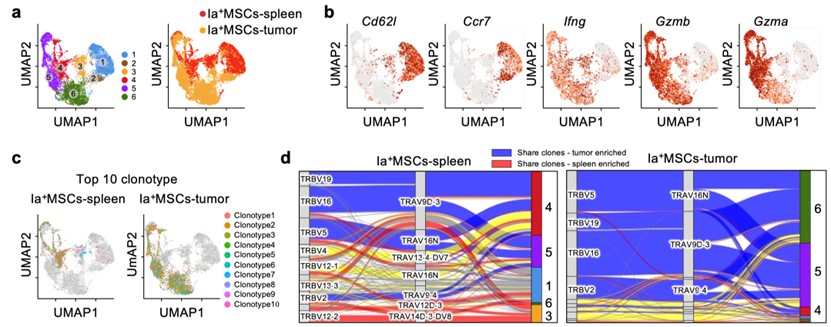Researchers Discover a CD8+ T Cell Population with Strong Anti-Tumor Capabilities
A research published in the Proceedings of the National Academy of Sciences of the United States of America on October 19th, 2023 uncovered a subtype of T cells with robust tumor-killing capabilities that resist exhaustion, elucidating the cellular and molecular mechanisms behind their identification and activation. This study titled “MHC Class Ib-restricted CD8+T Cells Possess Strong Tumoricidal Activities” was conducted by the research team led by Dr. WANG Ying and Dr. SHI Yufang from the Shanghai Institute of Nutrition and Health (SINH), Chinese Academy of Sciences.
CD8+ T cells play a pivotal role in anti-tumor immune responses. Current tumor immunotherapy strategies based on CD8+ T cells, such as CAR-T and TCR-T cells, are burgeoning. However, their limited universality, inability of infiltration into solid tumors, susceptibility to exhaustion, and high production costs pose key challenges to breakthroughs in tumor immunotherapy. One of the core issues is the lack of a universally effective prototype of T cells with broad tumor-killing abilities, necessary for developing “off-the-shelf” T cell therapy products.
This study revealed that Major Histocompatibility Complex (MHC) Ib-restricted CD8+ T (Ib-CD8+ T) cells possess broad-spectrum tumor-killing capabilities. This group of Ib-CD8+ T cells not only efficiently kills various tumor cells such as melanoma, colorectal cancer, lung cancer, and liver cancer but can also directly eliminate tumor cells lacking MHC class I molecules, effectively targeting tumors without harming normal tissues.
Through combined analysis using single-cell mRNA/TCR sequencing, this research identified that these tumor-killing Ib-CD8+ T cells express high levels of cytotoxic factors like IFNγ, GZMA, and GZMB, while showing low expression of exhaustion-related molecules like PD-1, TIM3, and TOX-1. Importantly, when used in treating solid tumors, Ib-CD8+ T cells exhibited significant infiltration at the tumor site and oligoclonal expansion, effectively suppressing tumor growth and prolonging the lifespan of tumor-bearing mice. Additionally, similar tumor-killing CD8+ T cells were observed in human solid tumor tissues.
Furthermore, the study elucidated the molecular basis for the activation and execution of the anti-tumor immune response by Ib-CD8+ T cells. The findings revealed that MHC class Ia molecules provide crucial signals for the activation and functional execution of Ib-CD8+ T cells, significantly reducing the activation threshold when they act upon Ib-CD8+ T cells. Using gene editing techniques or neutralizing antibodies, the research confirmed that the Tbet and NKG2D signaling pathways are critical for the pre-activation of Ib-CD8+ T cells' anti-tumor immune function by MHC class Ia molecules.
This study's groundbreaking revelation of the potent and efficient tumor-killing functionality of Ib-CD8+ T cells not only expands the understanding of CD8+ T cell anti-tumor immune responses but also lays a solid foundation for developing tumor immunotherapy based on Ib-CD8+ T cells.
Dr. LI Qing and Dr. LIN Liangyu from SINH are the co-first authors of the paper, and Dr. WANG Ying and Dr. SHI Yufang are the co-corresponding authors. The work received support from the National Key Research and Development Program of the Ministry of Science and Technology, the National Natural Science Foundation of China, and the technology platform and animal platform of SINH.

Clonal expansion of tumoricidal MHC Ib-restricted CD8+ T cells.
(Image by Dr. WANG Ying and Dr. SHI Yufang’s group)
Media Contact:
WANG Jin
Shanghai Institute of Nutrition and Health,
Chinese Academy of Sciences
Email: wangjin01@sinh.ac.cn
Web: http://english.sinh.cas.cn/
